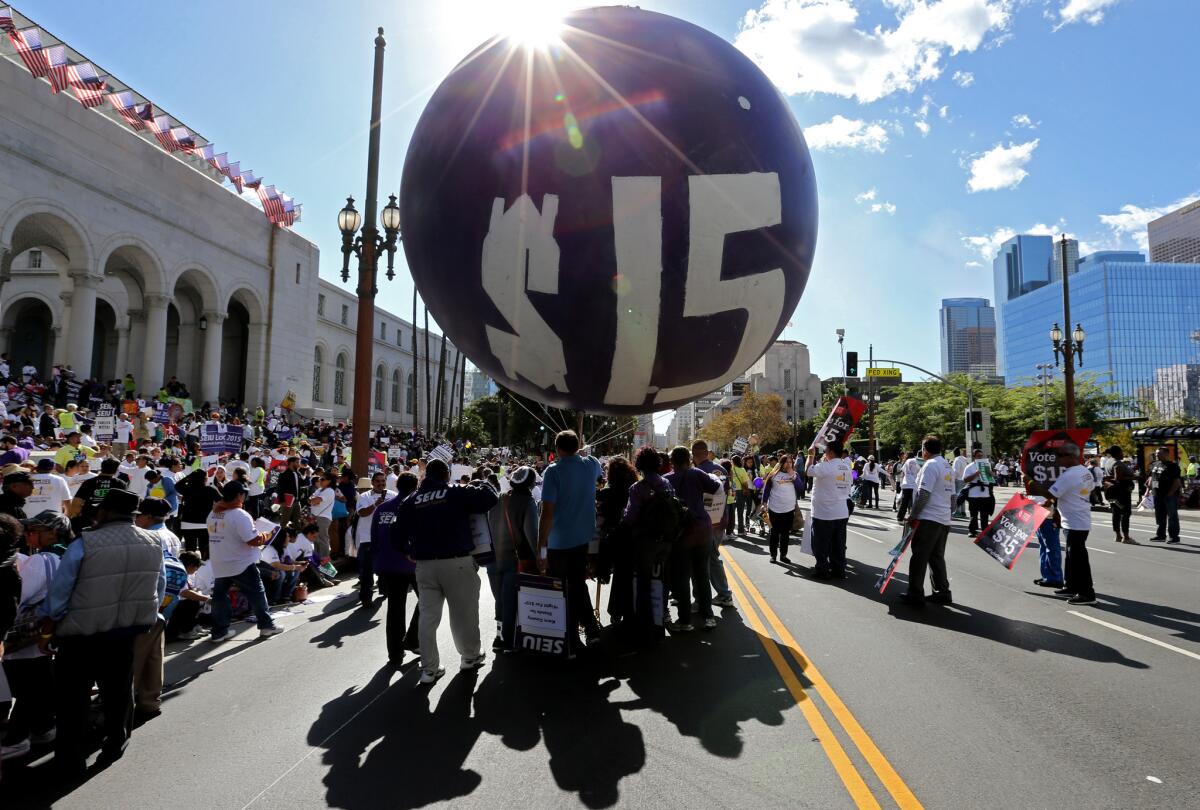Here’s what business and labor think about the proposed minimum wage hike

Workers rally outside Los Angeles City Hall on Nov. 10, 2015, to press demands for a minimum wage of $15 per hour.
Business groups said they are concerned about the effects of a proposed deal struck by lawmakers and labor unions for a $15 hourly minimum wage in California. The union behind the national movement for a higher minimum wage, not surprisingly, is doing a victory dance.
If approved by the Legislature, the state's minimum wage would gradually rise to $15 by 2022. Already, cities such as Los Angeles, San Francisco and San Diego have agreed to boost the minimum wage over the next few years.
Here's what you need to know.
When would wages rise?
On Jan. 1, 2017, California's minimum wage would bump up to $10.50 an hour from the current statewide rate of $10, according to a document obtained by The Times.
In 2018, there would be a 50-cent increase, and then $1-per-year raises through 2022.
Small businesses with fewer than 25 employees would get an extra year to reach compliance and would have to pay their workers a $15 hourly wage by 2023.
What do you think? Vote now in our Twitter poll >>
What do business groups think about it?
The National Federation of Independent Business opposes the tentative deal because, it said, the measure would place an additional burden on small businesses.
Tom Scott, state executive director of the NFIB California, said 90% of his organization’s members believe any increase in the minimum wage would be detrimental to their operations. The organization represents small businesses with fewer than 500 employees, and has 22,000 members in California.
Ruben Gonzalez, senior advisor of strategic affairs for the Los Angeles Area Chamber of Commerce, said he was concerned about how the proposed state law would interact with local minimum wage regulations.
If there is no provision that says the state law supersedes local minimum wage laws, there could be some municipalities adopting higher minimum wages faster or at different levels, Gonzalez said.
"We are more than willing to work with all stakeholders, roll up our sleeves and figure out how we bridge the compensation gap that we’re all facing," he said.
What do labor groups think?
The Service Employees International Union called the proposed deal a "huge victory."
"It's a win that shows the power of standing up and sticking together," SEIU International President Mary Kay Henry said in a statement. "It also shows the power that the 64 million people all over the country who make less than $15 will bring to the ballot box this November."
The SEIU has backed the 4-year-old Fight for $15 campaign, which seeks better pay for fast-food workers and other low-wage workers.
If approved, the California deal would be the biggest victory yet for the campaign, said Kendall Fells, national organizing director for Fight for $15.
"I think that it shows workers around the country that it's possible," he said. "Now in other cities, workers are feeling more and more emboldened because they see what happened in California. These workers have already shown they have the right formula to win."
Could the proposal have an effect outside of California?
"There are absolutely going to be national implications," said Chris Tilly, director of the UCLA Institute for Research on Labor and Employment. "I expected other states to follow suit, and I expect pressure to build for a federal minimum wage increase."
He said New York will likely be the next state to jump in on $15 hourly minimum wage legislation based on the state's "rivalry" with California for being "forward-thinking." New York is currently considering a minimum wage increase proposal.
For more business news, follow @smasunaga
Inside the business of entertainment
The Wide Shot brings you news, analysis and insights on everything from streaming wars to production — and what it all means for the future.
You may occasionally receive promotional content from the Los Angeles Times.








